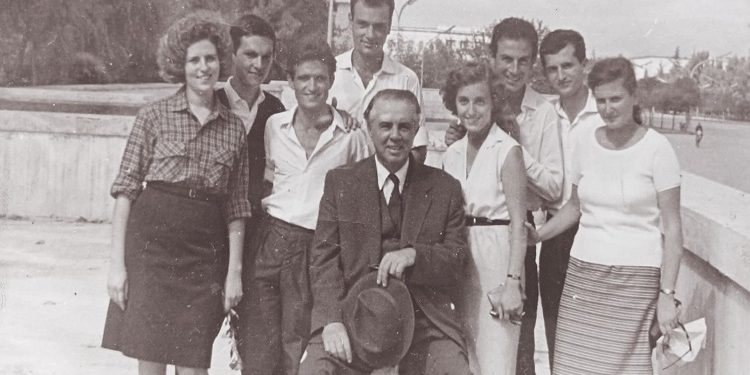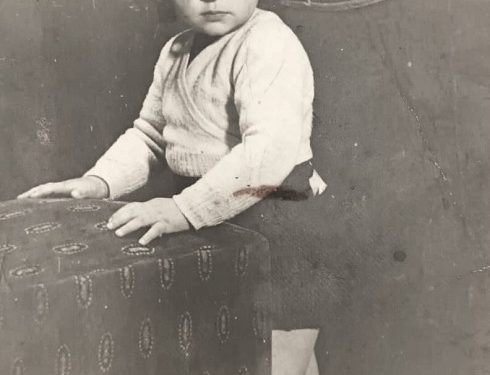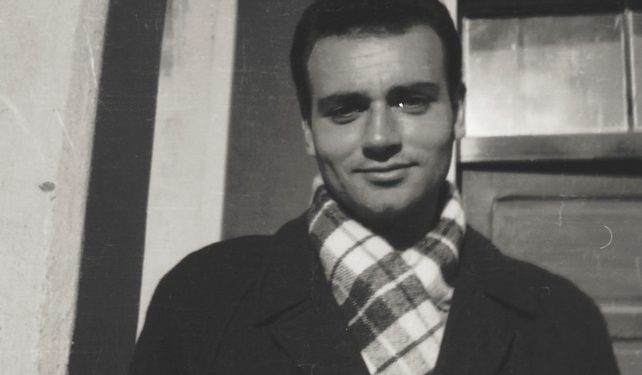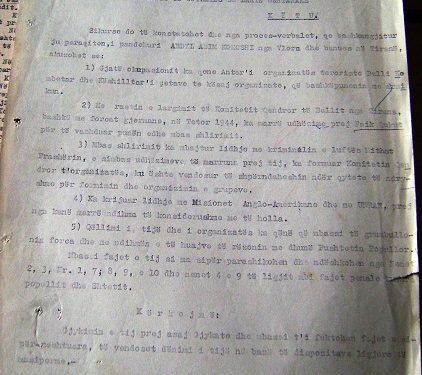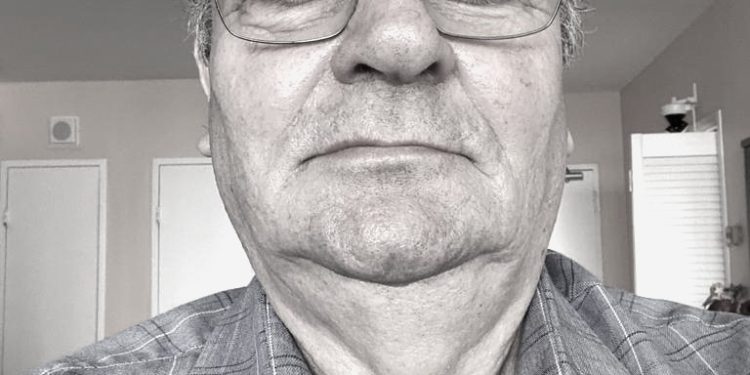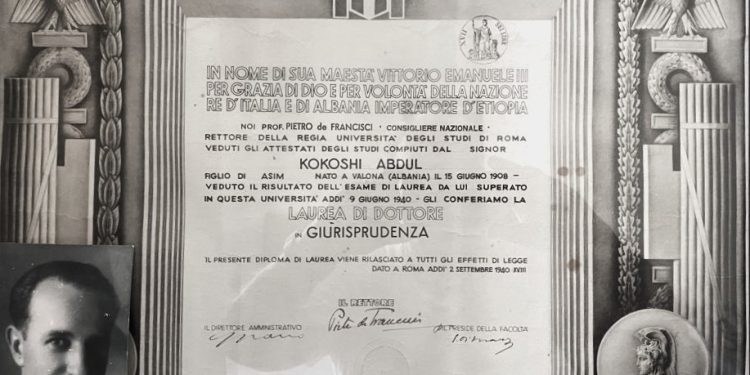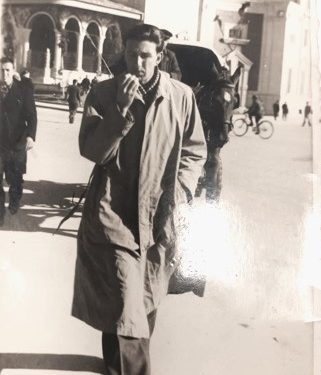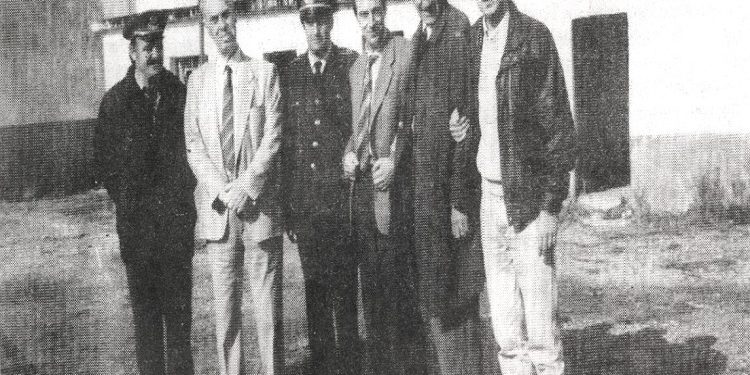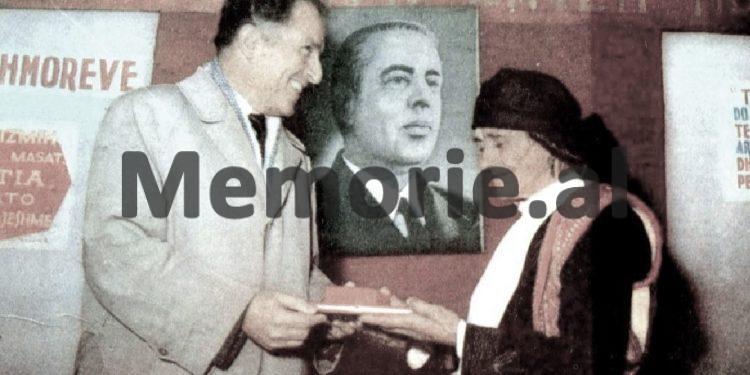From Uvil Zajmi
The first part
– “The father was shot, after he refused to meet with Enver and refused to become the president of the Supreme Court” –
Memorie.al / He were only 3 months old, newly born, from the day he was separated from his father, whom he never saw, never knew, and never met. Left an orphan with only his mother, then childhood, adolescence, youth, a boy with a shot father, a persecution that followed him for many years. With little information from what happened with his father, he could not even mention his name, because as a legacy, a memory, he had left his last name, a wristwatch, and his diploma. With the mother, a noble woman, who kept quiet the drama that struck her when she was a young, beautiful girl, newly married, and with a newborn child. A long ordeal, from the arrest of the husband, the investigation, the court process, the punishment, then, life amidst suffering, and raising the child without a father.
This is the story of Artan Kokoshi, the son of Abdyl Kokoshi, sentenced to be shot in 1947, with the “Trial of the deputies”. Years ago he left Shkodra and Albania for Toronto, Canada, where he lives today with his wife, two daughters, granddaughter and grandson, with his brother Amir and his family.
In a story that is not easy to tell and write, a big wound in his life, reserved, Artani returns to that event, from Enver Hoxha’s revenge on Abdyl Kokoshin, after the proposal to make him President of the Supreme Court, to the provocations, State Security threats against his mother and the enigmatic photo with Enver Hoxha, which prompted the reaction and punishment of the professor of electricity at the university. From the anger of Muho Asllani, to the history of the Vlora patriotic family, Kokoshi, with the tradition and contribution to the history of Vlora and Albania as well, and its extraordinary persecution, deportations, punishments, sufferings, in the prisons of the communist dictatorship.
THE TRIAL OF DEPUTIES
A Tirana, an Albania, citizens, family members, have experienced great tension and anxiety at the end of September 1947, which is related to one of the most sensational judicial processes, conceived, fabricated, and developed by the communist regime, the dictatorship, personally Enver Hoxha, with the aim of punishing, eliminating an elite, a group of intellectuals graduated abroad, just because they had ideas and thought differently from the communist philosophy of the dictator and his followers.
A process started in 1946, with arrests, imprisonments, long interrogations, torture, and then the public trial, held in Tirana, in the “Kosova” cinema hall, from September 4 to 27, 1947, followed on the radio across the country and from the capital, between speakers. Considered the “first opposition group”, the critical voice, but eliminated by the dictatorship, with the aim of eliminating the political elite and opponents of the regime.
A group of intellectuals, personalities educated, schooled and graduated in the West, among them deputies, of the first legislature elected in December 1945, with democratic, pro-Western and pro-American ideas and preferences. A process that took place at the moment when the People’s Assembly had to ratify the convention with Yugoslavia, determining the direction of internal and external policy, such as the pro-Eastern one with that of the Soviet Union.
The trial of the deputies was a completely manipulated process, commanded by the Council of the Supreme Court, with a military court, composed of Major Niko Çeta, the president and two assistants; Nexhat Hyseni and Mustafa Iljazi, with the rank of captain. They were the ones who gave the heavy sentences, when out of the 24 accused, 16 were sentenced to death, with executions by hanging on a rope, shooting, the others with life imprisonment.
ARTAN KOKOSHI: “DUE TO THE REVENGE OF THE ELECTRICITY PROFESSOR, I LOST THE UNIVERSITY”
Mr. Artan, two words about your parents’ families?
I was born in February 1946, I was a baby, when my father was arrested, and who comes from a large, well-known and traditional family, from Kokoshet in Vlora. There were 6 children, 4 boys and two girls, the father was the eldest. While the mother’s family is from Sulot e Libohova, father Reuf Sulo, a pharmacist graduated in Turkey, settled in Shkodër in 1900, as a developed city, with the opportunity to practice the profession of pharmacist. But, unfortunately, he died very young, not even 50 years old, leaving his wife, four children, two daughters and two sons.
How did the mother meet the father, then the marriage, and the arrest?
The grandmother, i.e. the mother of the mother, from Gjirokastria, was the sister of the wife of Dr. Basri Qadhim, a doctor who was awarded in Istanbul, with a great reputation in Shkodër. One of Dr. Basria’s daughters, Muhaseri, married Sulo Klosin, an engineer, graduated in Strasbourg.He was very good friends with his father, and starting from their friendship, he met Nezihana, his mother. Then the marriage, in Shkodër in 1945. Initially they lived in Tirana, at the Beshir’s house, a rented entrance; I was born there too, not in the maternity ward. Meanwhile, after the war, the father opened a coffee shop in Tirana, a private activity, since he was not offered a job as a lawyer. A lawyer by profession, but working as a coffee shop owner, he was arrested there.
The father, graduated in Rome, but the Italians refuse his degree?
Graduated in Rome, for law, there is a curiosity that, as an anti-fascist, the Italians did not give him the degree when he finished in 1936, but in 1940, only when they invaded Albania, they handed it over to him. I have that diploma at home, my uncle, Angel, had hidden it. I don’t know how he was able to save it, since their house in Vlora was raided. It is the only memory I have of my father, as well as a wristwatch, which he was able to secretly give to a prison policeman, a good man, who later gave it to my mother. Along with some pictures that were able to escape.
What was the accusation against the father, Avdylin?
The indictment was given by the Deputy Prosecutor General, Josif Pashko, then the military court was appointed by the Central Committee of the Albanian Communist Party. It is a long accusation over ten pages, where you read, you find names of the most famous, prominent intellectuals of the time. The father was accused as a former member of the ‘Balli Kombëtar’ of Vlora, for his connections with Mit’hat Frashëri, to re-establish the ‘Balli e Ri Kombëtar’ in Albania.
Another accusation was, for his connections with the American missions in Albania, for the installation of a western democracy. As well as the creation of illegal groups, of a Central Committee, to organize the overthrow of the People’s Power by insurrection, by violence.They considered all these accusations to be hostile activities.
A long, wild process, echoes, followed by the whole of Albania?
Being a lawyer, the father refused to take another defense, answering the questions himself. He was calm, and sure, he had done nothing of which they could accuse him. The mother never met him, as they did not leave the proceedings; she followed them outside the “Kosova” Cinema, between the loudspeakers. Only in the last few days and sessions, the father seemed worried, the mother said.
Something had happened, he was nervous, not calm, and he had changed his attitude. His mother was waiting for him, when they were taken out of the court, to take them to the Tirana Prison, he from the window of the bus, she saw him in despair, and with tears, she made some gesture to him, as if she wanted to tell him; I am innocent.
What happened to your family, that is, to your mother and to you personally, after the process for the father was closed?
After the trial ended, the death sentence was taken, the mother stayed for a while in Tirana, hoping that they could forgive her. Until they informed him that they had shot him, returning his clothing to his father’s parents, who had driven them away from Vlora, interning them in a village in Rrogozhina, where they lived in a wooden shack.
They met my mother and told her that it was impossible for them, given the conditions they were in, to keep her with me. Alone, without any support, without work in Tirana, she decided to return to Shkodër, where she had her family, her sister, her two brothers and her mother.
Did you also tell me about the provocations they made to your mother?
Yes, it’s more than true, they used to go to mom’s house late at night, security personnel, provoked her, interrogated her, and took her to the investigator. She, alone with me, reacted. One of them was Feçor Shehu, at that time head of the Internal Branch in Shkodër.
After your father’s conviction, what happened to the Kokoshi family and other relatives of your tribe?
The decision to hit the Kokoshi family had already been made. While my father was in the investigator, in the judicial process, at the same time, my uncle, Engjëll Kokoshi, not even 24 years old, was arrested and sentenced to 17 years in prison. They kept him in Vlora prison, where his uncle, Qazim Kokoshin, was also. In that period, Qazim’s son, Fatoshi, was also arrested and sentenced to 15 years in prison. My aunt’s husband, Shefki Minarollin, also with the “Group of Deputies”, was sentenced to 20 years in prison.
Aunt’s family was removed from Tirana, taken to Shijak, where they lived for many years. Other relatives were also in camps and prisons. They were arrested as acquaintances or relatives of the “Group of Deputies”. In the same way, Sulo Klosin, the husband of my mother’s aunt’s daughter, also with the “Group of Deputies”, was sentenced to death, by hanging, and left him hanging in the Rubik for several days, so that the city could see him, the people where he had worked as an engineer. Angel, the uncle, was lucky not to be killed.
Did you tell me about a man who stayed close to mom in those difficult months?
The person who stood by her from the first day her father was arrested, during the court process, until the day she was sentenced and shot, was her uncle’s daughter, Bediha Sulo, (Këlliçi), who lived in Tirana. Think about it, the single mother, 27 years old, without anyone; she has not been separated from her for a single moment. He accompanied her in that difficult period of hers, with me in her hand and with her husband in court proceedings.
What do you think, or more precisely, what conclusions have you come to after so many years, regarding the real reason why your father was hit by Enver Hoxha?
At the end of 1944, that is, a few days after the war ended, Enver Hoxha, between Hysni Kapo, sent word to his father, Abdyl, (since they had acquaintance and friendship, as Vlonjats), saying that; “to come and meet me in the office, as we have thought of making him President of the Supreme Court”. But, the father opposed it, did not accept and did not even meet him, stating that; “I can’t punish my friends, my comrades, and my people”. So, the rejection he made to Enver’s offer, I think was one of the motives that started the revenge against him and the entire Kokoshi tribe. They considered it an insult and disrespect.
How did the mother’s life continue after her husband was shot?
The mother, a teacher, was fired from her job. She married again, and her husband, Xhemal Lopçi, also a teacher, from a well-known Shkodra family, treated me as his son. He was the father, a real parent to me. He raised me, educated me, and educated me. I felt very close to him, his interest, and his warmth. From the second marriage, a son was also born, Amir, my brother, with whom we are not separated, for a single moment. We are more than two brothers. We and our families, and also our children. Even in Canada we are together. Of my father’s tribe, I had no one left. Only the children of uncles and aunts, but they have left Vlora for years.
When you were in university, that is, in another phase of your life, but not without problems?
In 1963, I am in my first year at the Faculty of Mechanical Engineering, a meeting was held to elect the youth secretary. They proposed me, but Vangjel Çerava intervened, saying, “He is not suitable for this job, they have family problems”, and that was it. It was a blow, not easy for me.
We come to the professor who punished you, where as a result, you lost the university?
It was 1967 and I was in my fourth year at the University, I had the last one left and my diploma. But, precisely at the end of the season, a well-known professor, who taught electro-mechanics, a secondary subject, stayed with me for the fall. I prepared myself, while someone also met him, spoke to him, told him that; the student is an orphan. I had started to answer with his assistant, when the professor enters the classroom, “leave it – he says, – because I will ask him”.
He saw the exercise, “no – he said – this is not the solution, and this is how it is done in high school”. It was meant to stay with me and it did. I lost the year, the university. The damage he did to me was very great, morally and economically (since I slept in the dormitory), in opinion and everywhere. Even today I have him as a hostage, an enigma remains for me, as to who pushed him and who encouraged him to act like that towards me. I never met that professor, since after the 90s; he was also a deputy of the Socialist Party.
Is this event related to one of the pictures you just showed me?
It was the school year 1966-’67 and it is a photograph, taken in the square in front of the university, with Enver Hoxha. It was quite a coincidence. He had gone out for a walk from the lake and on his way back on foot; he was passing in front of the central corps, while the car accompanied him on the road. We, some students, were there when he approached, “I haven’t gone out, I don’t have any photos with the students”, he said. “If you have a camera, take one with yours, – he said, – because this one, – addressing Sulo Gradeci, – does not give you the photos”.
And how did her story go, which had consequences for you?
After a few days, a pharmacist from the “Block” came to the faculty, with the photographs and was looking for the people who had come out there; he wanted to give them to each of them. They were in color, and of course they had received information, who was the students in the picture. “How can this student, the son of a persecuted man, appear in a photograph with Comrade Enver”, were the words that circulated for me.
I had two students in the group, one was Enver Hoxha’s aunt’s son and they hung out a lot with the electro professor, influencing him. When we had an anniversary, after 1990, as former students, I was also invited, at first I didn’t want to go, and then I went. They were there too. “We did everything possible so that it wouldn’t stay, but it was a definite order” – as if they wanted to justify themselves. As for the photo with Enver, I don’t have it, the girl tore it.
After you were kicked out of university without finishing, how did your life continue?
By order of Beqir Balluku, the Minister of Defense, (we were about 8-9 students left, left from the university, mainly for biography issues), I was sent to perform compulsory military service, for two years, in Burrel, in a department anti-aircraft. I was correct and different from the soldiers, almost with a university degree. There was a Vlonjat commissar and at one point, to choose the youth secretary of the guild, everyone wanted to be me, but the commissar hesitated, did not have the courage to support me, keeping a silent position. Then they advised me not to accept, to give up and that’s how it ended.
After you finished your military service, where did you start working?
As soon as I finished the army, I started working at the Mechanical Plant in Shkodër. When an engineer, in order to implement a project, set up a working group, where he included Taho Sejko’s son, (Hector) Teme Sejko’s brother. It was a factory, a department where they loved me, we had made friends. I was very correct at work, with all the tasks assigned to me. I worked in shifts. Those of the party in the enterprise call the engineer, tell him about the two of us, to get us away. “No” – he objected, – these do my job”, and with his insistence, they left us in that work group.
What was your treatment, from the citizens, from Shkodra?
The mother of a Vlonjat friend of mine, whenever I went to their family, I remember that she always told me: “You are lucky, that you grew up here in Shkodër and not in Vlora, because there they would have put you in prison”. Otherwise, in Shkodër, this atmosphere was not felt much, the people of Shkodra, known as anti-communists, did not remember my father, or treats me like the son of a political prisoner, as that system considered. Shkodra is a tolerant city, they loved me and treated me well, regardless of my biography, and they did not fight class wars. Society did not react, on the contrary, the state, its officials, in every case, took out my biography.
Have there been any cases when you had problems with high-ranking, party and state officials?
Yes, I had, I remember very well, it was the year 1988, when I was proposed to open a service repair shop for motorcycles. After a year, by direct order of the first secretary for Shkodra, Muho Asllani, I was returned to the Mechanical Plant, in a heavy department, but my friends there did not let me do heavy work. In my place, a friend of Muho’s son was brought in to repair services.
Two words about your family?
It has not been easy at all, for me and my mother, who, as I said, only after her second marriage, started working as a teacher at the “Xheladin Fishta” school, where she retired. Even the mother was respected. I have not missed the warmth of people, friends, relatives, uncles, aunts. Then my acquaintance with my wife, Tači, from a wonderful family from Shkodra, marriage and two daughters, Ledi and Selda, grandchildren, who have filled my life. In Toronto, I also have my brother, Amir, his family.
Have you read the file of Avdyl Kokoshi?
I was able to get my father’s file only after the 90s. I see, I read the names of prosecutors, judges, witnesses, accusations, I feel despair, regret, but there is no turning back. I close it, open it, close it, I find that the father was interrogated many times by the investigator, tortured, as my mother told me, just to confess what they forced him to do.
Have you tried to find and have any information where your father’s remains may be located?
As for the shot bodies, they are gone. It was rumored that they were buried on the banks of the Tirana River, or at the former “Dinamo” plant, but who could care at that time. Even after 1990, there were attempts by the Association of former Political Prisoners, but nothing concrete. Not even a flower, a bit of soil, I could not decide, to throw on his remains, since there are no witnesses left, where his remains could be, if any traces remained. Memorie.al
The next issue follows




